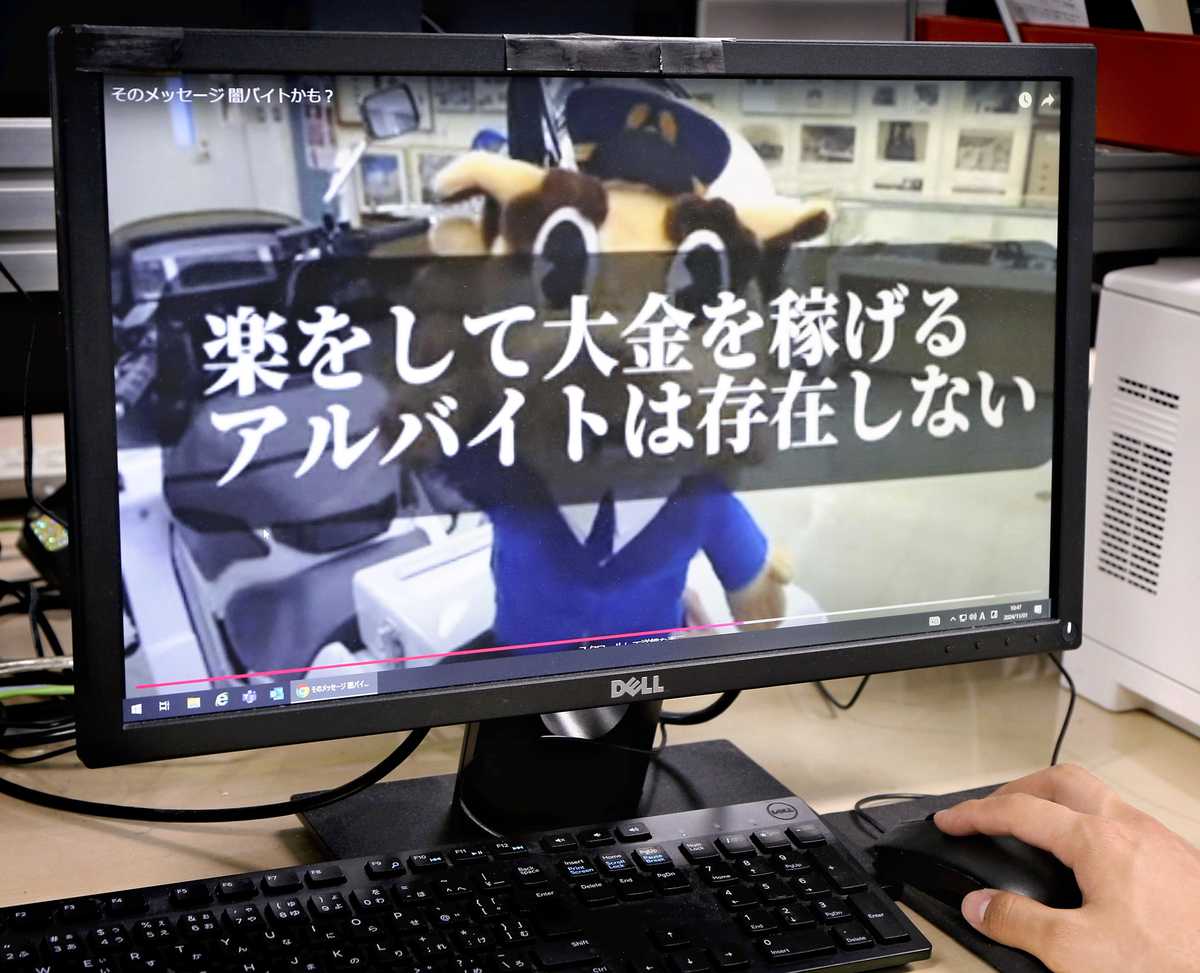Social Media Used to Cloak ‘Dark Part-Time Work’ in Japan; 41% of High School Students Have Seen Such Job Postings

A YouTube video from the Okinawa prefectural police warns about “dark part-time jobs”

17:58 JST, November 5, 2024
Most of the people caught in a series of robberies and other crimes committed in Tokyo and surrounding prefectures were lured into illicit jobs through social media, it has been learned. Those arrested have told police they were recruited via X (formerly Twitter) or similar social media platforms.
The majority of the arrested are young and were not compensated for their illegal deeds, and they themselves are paying a high price. Private sector research has found that nearly 50% of high school students have tried to find part-time jobs via social media. Police are warning the public never to accept suspicious job offers.
Found through X
Mazuki Takarada, 22, was arrested over a robbery and murder that occurred in Aoba Ward, Yokohama. “I looked on X for a part-time job that would bring me a lot of money quick, found a posting about a ‘clean’ job, and applied for that,” Takarada told investigators of the Kanagawa prefectural police.
The suspect said he did not know it was a “dark job” when he applied. Takarada also told police he had given the ringleaders his personal information and therefore couldn’t refuse their demands.
There have been 23 such crimes since August in Tokyo and five prefectures, and about 50 people have been arrested for committing robbery or collecting cash in 19 of the crimes. About 80% of the arrested suspects were in their teens or 20s.
According to investigative sources, most of those who committed the crimes responded to job offers posted on X, Instagram or other social media. The ringleaders made the postings look like offers of legal work — claiming, for example, that the jobs would involve transporting baggage or documents, or pick-up and drop-off services.
To prevent potential applicants from feeling wary, some postings emphasized that the offers were “clean jobs,” “not dark part-time work” or “involve no risks.”
No pay, heavy penalty
Such dark part-time work is believed to have began spreading in the 2010s, along with popularization of social media.
Initially, such jobs involved collecting money from victims of fraud or withdrawing money from scam victims’ bank accounts. It then diversified into trading in other people’s smartphones and bank accounts, and transporting other people’s baggage containing illegal drugs.
The crimes became increasingly heinous in 2022 and 2023, when a series of robberies directed by ringleaders calling themselves “Luffy” occurred. During that spate of crimes, an elderly woman was physically assaulted and killed in her home in Komae, Tokyo.
In the series of cases since this August, there has also been one robbery-murder and a case in which a victim was abducted to withdraw cash from their bank account.
Such crimes bring extremely heavy legal penalties. People convicted of fraud face up to 10 years in prison, and people deemed to have committed robbery can get at least five years in prison. Those convicted of robbery-murder face the death penalty or life imprisonment.
Most of the arrested suspects in the recent series of crimes have told police that they were not paid.
A senior official of the Metropolitan Police Department said: “People who do dark part-time work are used and thrown away. If they notice something strange, we want them to notify police even if they’re being threatened.”
Ambiguous details
The Mynavi Corp. job information agency surveyed about 650 high school students with part-time jobs in February, and 46% said they had searched for part-time jobs on social media.
In addition, 41% said they had seen suspicious job offers, and about 10% said someone tried to lure them to take such jobs.
But only half of the respondents knew that negotiating a job solely through social media puts one at risk of engaging in illegal acts.
According to Mynavi, there are many messages about dark part-time work on social media and matchmaking apps. The jobs are often described as “office work” or “light-duty work,” among other things.
The work itself is described ambiguously, such as “only making phone calls” or “just carrying items.” And most notably, large rewards are promised.
“Applicants should be especially wary if they can’t meet recruiters in person because they only communicate through social media, or if they’re required to present a driver’s license or other ID at the time of application,” a Mynavi official said.
Top Articles in Society
-

Man Infected with Measles Reportedly Dined at Restaurant in Tokyo Station
-

Man Infected with Measles May Have Come in Contact with Many People in Tokyo, Went to Store, Restaurant Around When Symptoms Emerged
-

Woman with Measles Visited Hospital in Tokyo Multiple Times Before Being Diagnosed with Disease
-

Australian Woman Dies After Mishap on Ski Lift in Nagano Prefecture
-

Foreign Snowboarder in Serious Condition After Hanging in Midair from Chairlift in Nagano Prefecture
JN ACCESS RANKING
-

Japan PM Takaichi’s Cabinet Resigns en Masse
-

Japan Institute to Use Domestic Commercial Optical Lattice Clock to Set Japan Standard Time
-

Israeli Ambassador to Japan Speaks about Japan’s Role in the Reconstruction of Gaza
-

Man Infected with Measles Reportedly Dined at Restaurant in Tokyo Station
-

Videos Plagiarized, Reposted with False Subtitles Claiming ‘Ryukyu Belongs to China’; Anti-China False Information Also Posted in Japan





















